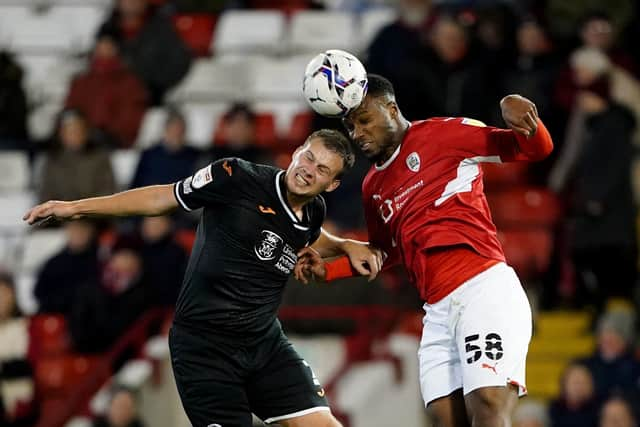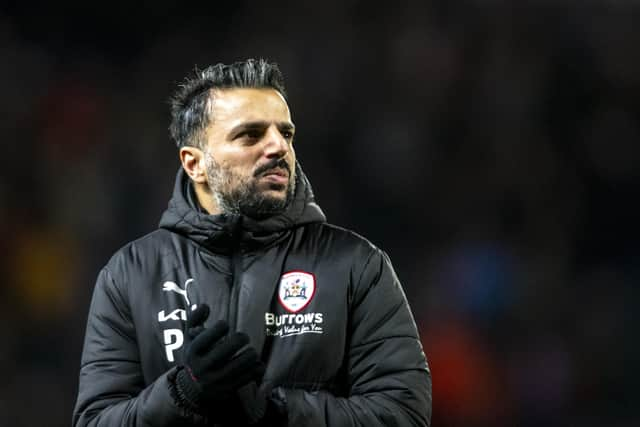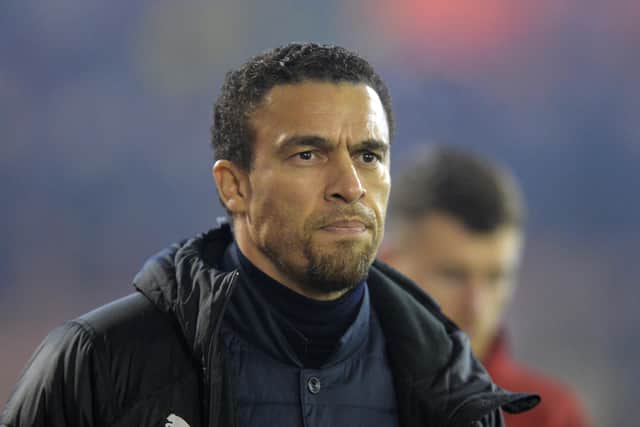Barnsley FC owners need to tweak business model as they adjust to their new, grim reality - Stuart Rayner
Anyone who knows anything about football can see 2020-21 was a good season for the Reds.
They narrowly avoided relegation from the Championship in the previous campaign and seem almost certain to suffer it this time instead. Indeed, they were right in the mire when Valerien Ismael arrived at Oakwell in late October 2020. So although they did not win the play-offs – narrowly beaten by eventual runners-up Swansea City in the semi-finals – it was still a job well done.
Advertisement
Hide AdAdvertisement
Hide AdThe praise was perhaps a little overblown. This was, after all, the same production-line theory which had driven previous coaches Daniel Stendel and Gerhard Struber to distraction and in the latter’s case resignation. That Struber was offered a job on Manchester United’s coaching staff recently – he turned it down because it was a short-term appointment – suggests the Austrian might have been worth indulging.


Had Barnsley signed striker Obbi Oulare as they tried to last January, things might not have gone so well because it could have meant doing without either Carlton Morris or loanee Daryl Dike. Given how well both did and how lamentable Oulare has presumably been on the training ground to have only earned 27 minutes of playing time under two coaches and an interim since he joined in the summer, it is fair to say the Reds got lucky. You cannot be successful without it.
Still, things went pretty well. Just not in the eyes of the board.
As far as they were concerned, the lack of bids for their best players meant the season was a disappointment. Captain Alex Mowatt ran his contract down and Michael Sollbauer, Conor Chaplin, Marcel Ritzmaier, Elliot Simoes and Rudi Pache left for the now ubiquitous undisclosed fees. It is fair to assume they were not bank-breakers.
Advertisement
Hide AdAdvertisement
Hide AdSo when Ismael was lured away by West Bromwich Albion – for probably the biggest transfer fee – his style of football was blamed in the corridors of power for the lack of would-be buyers queuing up for the Oakwell sales. A more attractive approach was needed.


Markus Schopp and Poya Asbaghi’s more entertaining football has so far brought single-goal wins over Coventry City, Derby County and Conference side Barrow after extra time in the FA Cup. For a return from 26 matches, it is not very much.
Now, barring something miraculous – and it must be said Barnsley have shown themselves capable of it a few times in recent years – they will be relegated and the cost to their finances will be around £8m.
Had they continued on the trajectory they were on under Ismael – and that would have been difficult no matter who they brought in to coach the same style – they might just have gone one better this season or next, and got into the Premier League. Stranger things have happened – just ask Danny Wilson.
Advertisement
Hide AdAdvertisement
Hide AdAs soon as the likes of Callum Styles, Callum Brittain and Cauley Woodrow had the words “Premier League” on their CVs, their values would have shot up, no matter how ugly the football they were playing in it.


It just shows the disconnect between the majority of football club owners and a team’s fans.
For some owners, it is about winning – they are very occasionally in it for their love of that club, or more likely their egos.
The dodgy nation states that own some of the country’s biggest clubs want to win as a diversionary tactic and to bring popularity in spite of often appalling behaviour back home.
Advertisement
Hide AdAdvertisement
Hide AdSay what you like about sportswashing, at least its interests overlap a lot with the fans, which is why so few Newcastle United supporters batted many eyelids when Mike Ashley made way for the wealth of Saudi Arabia.
Those who see it as a business opportunity, who view football through balance sheets, not league tables, are doomed to failure.
Very few people actually make good money from owning clubs, the best hope is to swap sterling for silverware.
As their summer change of course highlighted, Barnsley’s modus operandi is all about shifting stock – players and coaches. Take the money, buy more cheap stock, develop it, and the supposedly virtuous circle keeps whirring.
Advertisement
Hide AdAdvertisement
Hide AdThe problem is football rarely works like that. Successful clubs are based on a level of stability. Some keep their manager a long time and refresh the squad a little each window, others – like Chelsea – change the man picking the team quite often, but have a strong thread of continuity on the playing side.
Endless churn gets you where Watford are at the moment, stability creates the admittedly modest achievements at Rotherham United just now which Barnsley will be looking to emulate in six months.
Part of that continuity is about having a clear way of operating and Barnsley have that. They know what they are and what they are trying to do.
But no model is perfect, and theirs needs a little tweaking, most likely from the stopping-off point of League One. When that happens, they need to come at it from a footballing, not a financial perspective because, when money is in the driving seat, things tend to head in the wrong direction.
Comment Guidelines
National World encourages reader discussion on our stories. User feedback, insights and back-and-forth exchanges add a rich layer of context to reporting. Please review our Community Guidelines before commenting.